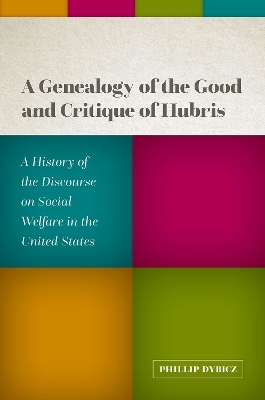
A Genealogy of the Good and Critique of Hubris
Oxford University Press Inc (Verlag)
978-0-19-767007-1 (ISBN)
Adopting Michael Foucault's genealogical method of historical investigation, Dybicz reaches back to the seventeenth century and describes four distinct eras in which a particular discourse dominated our understanding and efforts at social welfare. He examines how economic, political, social, and even geographic conditions shape society's perceived needs in social welfare. As well as examining how prominent intellectual thought, a philosophical paradigm describing reality and knowledge generation, defining cultural features and themes, and concepts of the self, all serve to shape our understanding of social welfare and what its desired qualities and aims should be. Together, the above elements coalesce to form a grand discourse that in the Foucaultian tradition speaks to an underlying urgent need of society, and various rules-of-right that shape knowledge generation.
Phillip Dybicz is Assistant Professor of Social Work at the University of North Alabama. He received his Ph.D. in 2006 at the University of Kansas, where he was fortunate to study under many of the key individuals who developed the strengths perspective. Bringing with him a keen appreciation of history, his exposure to postmodern thought led him to quickly embrace the works of Michael Foucault and to seek to emulate his genealogical method. His research has concentrated upon taking various postmodern concepts and thoroughly describing how they have been applied in social welfare to inform innovative approaches based in postmodern thought-such as the strengths perspective, narrative therapy, and solutions-focused therapy.
Chapter 1: The Relationship between Discourse and Social Welfare
Chapter 2: The Colonial American Discourse on Social Welfare (c. 1620-1820)
Chapter 3: Social Welfare Practices in Colonial America (c. 1620-1820)
Chapter 4: The Premodern Discourse on Social Welfare (c. 1820-1920)
Chapter 5: Social Welfare Practices in the Premodern Era (c. 1820-1920)
Chapter 6: The Modern Discourse on Social Welfare (circa 1920-present)
Chapter 7: Social Welfare Practices in the Modern Era (c. 1920-present)
Chapter 8: The Emerging Postmodern discourse on Social Welfare (c. 1990-present)
Chapter 9: Solutions, Narrative, and Strengths (c. 1990-present)
Chapter 10: Social Welfare at a Crossroads
| Erscheinungsdatum | 30.01.2023 |
|---|---|
| Verlagsort | New York |
| Sprache | englisch |
| Maße | 243 x 164 mm |
| Gewicht | 771 g |
| Themenwelt | Recht / Steuern ► EU / Internationales Recht |
| Recht / Steuern ► Privatrecht / Bürgerliches Recht ► Berufs-/Gebührenrecht | |
| Sozialwissenschaften ► Pädagogik ► Sozialpädagogik | |
| Sozialwissenschaften ► Soziologie | |
| ISBN-10 | 0-19-767007-5 / 0197670075 |
| ISBN-13 | 978-0-19-767007-1 / 9780197670071 |
| Zustand | Neuware |
| Informationen gemäß Produktsicherheitsverordnung (GPSR) | |
| Haben Sie eine Frage zum Produkt? |
aus dem Bereich


